2018-2019学年外研版英语七年级下册:Module11 Body language 课后练习(含答案)
2019-2020学年度初中英语七年级下Module 11 Body languageUnit 1 They touch noses!外研版练习题第二篇
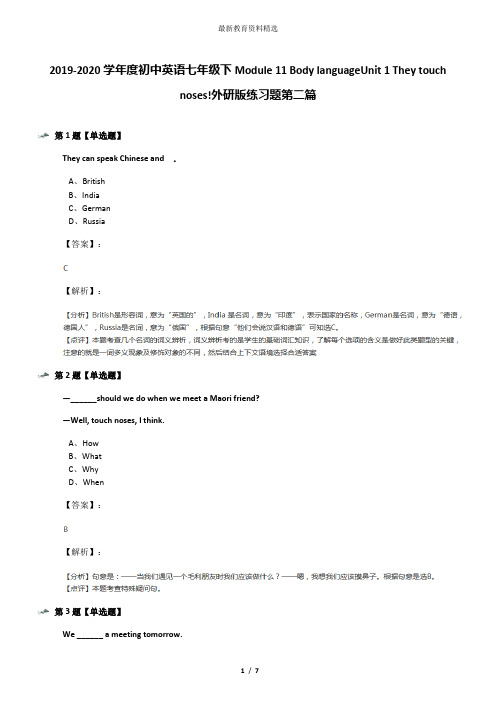
2019-2020学年度初中英语七年级下Module 11 Body languageUnit 1 They touchnoses!外研版练习题第二篇第1题【单选题】They can speak Chinese and .A、BritishB、IndiaC、GermanD、Russia【答案】:【解析】:第2题【单选题】—______should we do when we meet a Maori friend?—Well, touch noses, I think.A、HowB、WhatC、WhyD、When【答案】:【解析】:第3题【单选题】We ______ a meeting tomorrow.A、haveB、going to haveC、are going to haveD、had【答案】:【解析】:第4题【填空题】When the boy sees his mother,he always______【答案】:【解析】:第5题【填空题】People usually______in some western countries when they see each other.【答案】:【解析】:第6题【填空题】完成句子(1)老师们总是对我们微笑。
The teachers always ______ ______ us.(2)让我们彼此拥抱一下吧。
Let’s ______ ______ ______.(3)当你们遇到来访者时, 你们握手吗?When you meet the visitors, do you ______ ______? (4)在不同的国家, 我们会做不同的事。
In ______ ______, we do different things.(5)我昨天迟到了。
那是因为我的车坏了。
I was late yesterday. ______ ______my car was broken. 【答案】:【解析】:第7题【填空题】用所给词的适当形式填空(1)My pen friend is a______(France)girl.(2)She always wears______(fun)glasses.(3)He told stories of Zheng Chenggong to the______(visit).(4)Many______(Germany)students are coming to our school to study Chinese. (5)Each of them never______(get)a holiday.【答案】:【解析】:第8题【翻译】英译汉each otherput…togetherhead teacher【答案】:【解析】:第9题【翻译】在团队中互相帮助很重要。
2018版七年级英语下册Module11Bodylanguage专项训练新版外研版
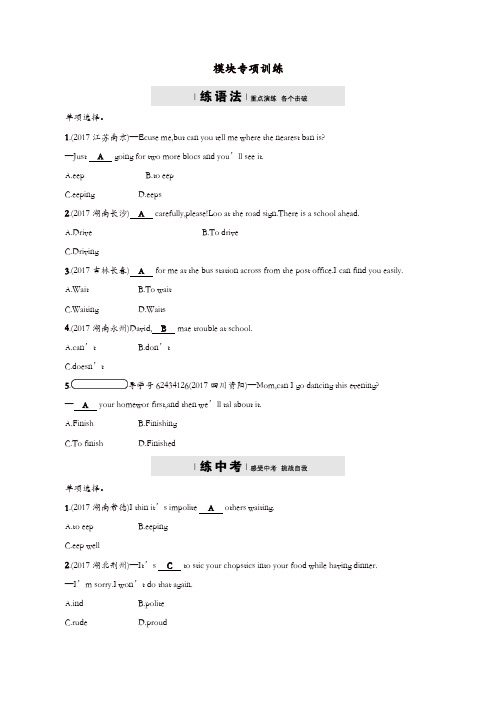
模块专项训练单项选择。
1.(2017江苏南京)—Ecuse me,but can you tell me where the nearest ban is?—Just A going for two more blocs and you’ll see it.A.eepB.to eepC.eepingD.eeps2.(2017湖南长沙) A carefully,please!Loo at the road sign.There is a school ahead.A.DriveB.To driveC.Driving3.(2017吉林长春) A for me at the bus station across from the post office.I can find you easily.A.WaitB.To waitC.WaitingD.Waits4.(2017湖南永州)David, B mae trouble at school.A.can’tB.don’tC.doesn’t5.导学号62434126(2017四川资阳)—Mom,can I go dancing this evening?—A your homewor first,and then we’ll tal about it.A.FinishB.FinishingC.To finishD.Finished单项选择。
1.(2017湖南常德)I thin it’s impolite A others waiting.A.to eepB.eepingC.eep well2.(2017湖北荆州)—It’s C to stic your chopstics into your food while having dinner.—I’m sorry.I won’t do that again.A.indB.politeC.rudeD.proud3.导学号62434127(2017四川眉山)—I’m sorry,Miss Green.I left my math boo at home. —It doesn’t matter.Please remember D it here tomorrow.A.taingB.to taeC.bringingD.to bring4.(2016甘肃白银) People usually touch something with their D.A.eyesB.nosesC.mouthsD.fingers5.(2016湖北武汉)—There’re four bedrooms in the house, C with its own shower.—That’s what I want.I’ve got a few ids.A.eitherB.neitherC.eachD.none书面表达。
外研版七年级英语下 Module_11__Body_language_Unit_2__Here_are_some_ways_to_welcome_them_hhh.

shake hands and smile when they meet. They usually __________
Where are they from?
Maybe
They are from America. They are American. How do they greet? They usually _______________ shake _________ kiss _______________________ hands, when they meet. or hug each other
In Greece, it’s not at all polite! In fact, it’s very rude.
wave to say goodbye be careful in fact
挥手告别 小心 事实上
语法讲解----祈使句
But be careful!
1.—Don’t be late again, Mike? —_______________. A. No, I don’t C. Sorry, I won’t B. Don’t worry D. I don’t know
Maybe
Where are they from? They are from New Zealand. They are Maori. How do they greet?
They touch noses.
You know, when we meet others, we often use our body to greet each other. Now, let learn about our body.
head
ear
【推荐】2019春七年级英语下册Module11BodylanguageUnit3Languageinuse课时作业新版外研版.docx
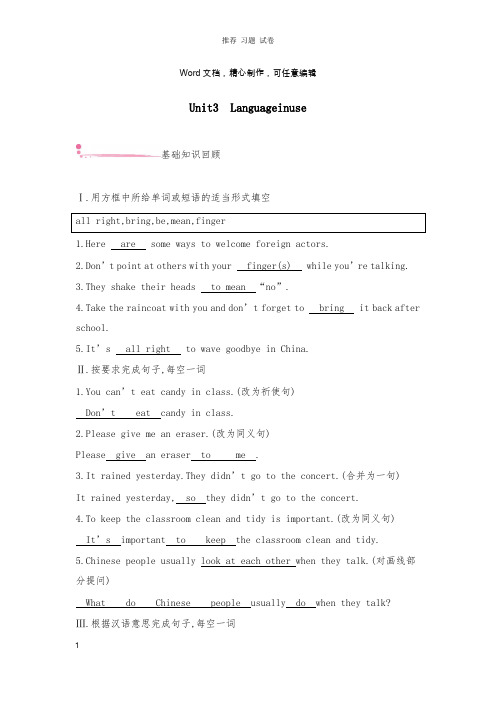
Word文档,精心制作,可任意编辑Unit3 Languageinuse基础知识回顾Ⅰ.用方框中所给单词或短语的适当形式填空1.Here are some ways to welcome foreign actors.2.Don’t point at others with your finger(s) while you’re talking.3.They shake their heads to mean “no”.4.Take the raincoat with you and don’t forget to bring it back after school.5.It’s all right to wave goodbye in China.Ⅱ.按要求完成句子,每空一词1.You can’t eat candy in class.(改为祈使句)Don’t eat candy in class.2.Please give me an eraser.(改为同义句)Please give an eraser to me .3.It rained yesterday.They didn’t go to the concert.(合并为一句)It rained yesterday, so they didn’t go to the concert.4.To keep the classroom clean and tidy is important.(改为同义句)It’s important to keep the classroom clean and tidy.5.Chinese people usually look at each other when they talk.(对画线部分提问)What do Chinese people usually do when they talk?Ⅲ.根据汉语意思完成句子,每空一词1.给他们更多的私人空间。
2018版七年级英语下册Module11Bodylanguage专项训练新版外研版
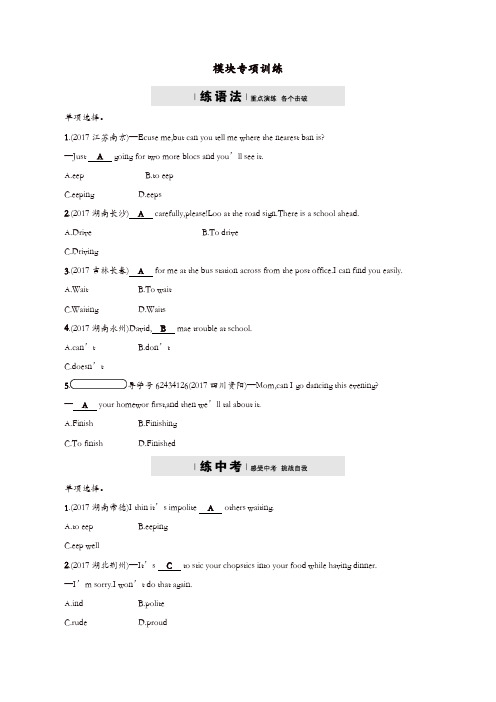
模块专项训练单项选择。
1.(2017江苏南京)—Ecuse me,but can you tell me where the nearest ban is?—Just A going for two more blocs and you’ll see it.A.eepB.to eepC.eepingD.eeps2.(2017湖南长沙) A carefully,please!Loo at the road sign.There is a school ahead.A.DriveB.To driveC.Driving3.(2017吉林长春) A for me at the bus station across from the post office.I can find you easily.A.WaitB.To waitC.WaitingD.Waits4.(2017湖南永州)David, B mae trouble at school.A.can’tB.don’tC.doesn’t5.导学号62434126(2017四川资阳)—Mom,can I go dancing this evening?—A your homewor first,and then we’ll tal about it.A.FinishB.FinishingC.To finishD.Finished单项选择。
1.(2017湖南常德)I thin it’s impolite A others waiting.A.to eepB.eepingC.eep well2.(2017湖北荆州)—It’s C to stic your chopstics into your food while having dinner.—I’m sorry.I won’t do that again.A.indB.politeC.rudeD.proud3.导学号62434127(2017四川眉山)—I’m sorry,Miss Green.I left my math boo at home. —It doesn’t matter.Please remember D it here tomorrow.A.taingB.to taeC.bringingD.to bring4.(2016甘肃白银) People usually touch something with their D.A.eyesB.nosesC.mouthsD.fingers5.(2016湖北武汉)—There’re four bedrooms in the house, C with its own shower.—That’s what I want.I’ve got a few ids.A.eitherB.neitherC.eachD.none书面表达。
七年级英语下册 Module 11 Body language Unit 1 They touch
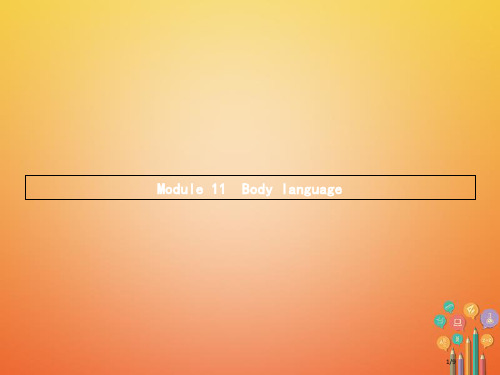
8/9
1 bow—3; kiss—1; shake hands—2;smile—1/2/3 2 French—1; Japanese—3; Russian—2 听力原文: Daming:What are they doing? Betty:They’re saying hello.They’re kissing. Daming:Are they German?Or British? Betty:Maybe they’re French. Daming:And these people are shaking hands.I think they’re Russian. Betty:I think so too.And these people are Japanese,I think. Daming:Why? Betty:Because they’re smiling at each other and bowing. 3 1.kiss 2.India 3.together 4.Russia 5.touch 6.vtouch noses!(教材P66)他们互碰鼻子! [解读] touch用作动词,意为“接触;触摸;触及”。 Be careful not to touch the working machine. 当心不要碰触这台工作着机器。 He touched the boy’s head and then gave him a hug. 他摸了摸这个男孩头,然后拥抱了他。 拓展touch名词,意为“接触;联络;关系”。be/get/stay/keep in touch with意为“和……保持联络”。 Goodbye,everyone.Stay in touch! 大家再见。保持联络! With QQ,people can get in touch with each other. 人们用QQ能够彼此联络。
- 1、下载文档前请自行甄别文档内容的完整性,平台不提供额外的编辑、内容补充、找答案等附加服务。
- 2、"仅部分预览"的文档,不可在线预览部分如存在完整性等问题,可反馈申请退款(可完整预览的文档不适用该条件!)。
- 3、如文档侵犯您的权益,请联系客服反馈,我们会尽快为您处理(人工客服工作时间:9:00-18:30)。
Module11 Body language 课后练习题一:翻译题:1.当他到家的时候他总是先写作业。
2.他进入教室然后开始读书。
题二:翻译题:1. 当她在家的时候,她总是帮妈妈做家务。
2. 他喝了一杯水然后就出去了。
题三:1. 我不喜欢他那样吃东西。
2. 我一点也不喜欢这种花。
题四:1.他不喜欢约翰那样读书。
2.他一点也不喜欢苹果。
题五:1.其实,这正是你要找的那本书。
2.不要对别人那么粗鲁。
3. He speaks so_______ (rude).题六:1. 其实,他正是你可以帮助的人。
2. 他对他的同学很粗鲁。
3. He answered the question_______ (rude).题七:翻译题:他比他的弟弟矮。
题八:翻译题:这个教室比我们的教室大。
题九:翻译题:1.他从来没有笑过。
2.不要笑他,他很害羞。
3. She never _______ at anyone.A. smileB. smilesC. laughD. laughes题十:翻译题:1. 她脸上露出亲切的微笑。
2. 不要嘲笑不幸的人。
3. He _______ at me and shook hands with me.A. smiledB. smilesC. laughD. laughs题十一:Kevin is a 12-year-old boy. He 1 from New York. He is in Class 5, Grad e 7. Mr Zhang is his class teacher. He is a good teacher. All the students of 2 class like him very much. There are forty 3 in the class. You can see forty desks, chairs and a teacher’s desk in the classroom.A lost and found box is 4 the teacher’s desk. T here 5 a lot of things in it.The students are in the classroom now. Betty is 6 her crayons, but she can’t find themin her bag. Tony is looking for his 7 . It’s a nice watch. Jim is8 an interesting book.Look! Mr Zhang is coming in. He 9 to the class, “Good morning, class. There are a lot of things in the lost and found box. Please be 10 with your things from now on.” Betty and Tony are very happy to find their lost things in the lost and found box.1.A. gets B. comes C. leaves D. goes2.A. my B. their C. his D. her3.A. boys B. girls C. students D. teachers4.A . for B. on C. from D. at5.A. are B. be C. have D. has6.A. playing with B. looking for C. waiting for D. looking at7.A. camera B. eraser C. wallet D. watch8.A. reading B. seeing C. watching D. looking9. A. tells B. talks C. says D. speaks10.A. happy B. busy C. careful D. strange题十二:Six mornings a week, Rajendra Prasad gets on his bicycle and starts work. He puts on his postman’s uniform(制服), and takes 1 to the desert villages of Rajasthan. He wears a turban on his head because the desert sun is very hot. When he gets to a village, he rings the bell(按铃) on his bike and everybody 2 out. They don’t get many visitors 3 they’re excited. Today, Rajendr’s first stop is Geeta’s house. She’s got a postcard 4 her cousin in Bangalore. Rajendra has to read it because Geeta can’t read. The news is good, so she’s happy.Rajendra doesn’t 5 take the mail. He also takes the pension(退休金) money for the old people. Today Sua gets her pension. She can’t 6 her name, so she has to give her fingerprint(指纹) instead. Rajendra has to 7 because she’s old. “I don’t know how 8 I am,”says Sua. “Maybe 50 or 60?” Her friends think she’s a bout 75 .Rajendra also takes a telephone becaus e many of the villages don’t have phones. Today, Samundar wants to make a call. She 9 Rajendra the phone number and he dials(拨电话号码) for her. She speaks to her son Vishnu. “I told him to come home because I need some mo ney,” she says.At the end of the day, Rajendra does the paper work and thinks about his 10 . “Sometimes it’s difficult, but it’s a good job,” he says.1. A. work B. mail C. food D. call2. A. works B. takes C. runs D. stands3. A. but B. so C. because D. or4. A. with B. for C. from D. as5. A. even B. also C. often D. only6. A. write B. read C. say D. hear7. A. help B. know C. make D. put8. A. clever B. kind C. tall D. old9. A. buys B. gives C. catches D. sends10. A. travel B. study C. job D. life[:Module11 Body language课后练习参考答案题一:1. When he gets home, he always does his homework first.2. He came into the classroom and began to read.解析:1. do one’s homework做作业。
2. and 连接的是两个并列的谓语动词。
题二:1. When she stays at home, she always helps her mother with the housework .2. He drank a glass of water and went out.解析:1. stay at home呆在家里。
2. and 连接的是两个并列的谓语动词。
题三:1.I don’t like him to eat like that.2.I don’t like the flower at all.解析:1. like that像那样。
2. not …at all一点也不。
题四:1. He doesn’t like John to read like that.2. He doesn’t like apples at all.解析:1. like that像那样。
2. not …at all一点也不。
题五:1. In fact, This is the book you are looking for.2. Don’t be rude to others.[:3. rudely解析:1. you are looking for是定语从句修饰前面的名词book。
2. be rude to sb. 对某人粗鲁。
3.句意:他说话如此地粗鲁。
这里应该用副词来修饰动词。
题六:1. In fact, he is the man you can help.2. He is rude to his classmates.3. rudely解析:1. you can help作定语修饰前面的名词man.2. be rude to sb.对某人粗鲁。
3. 句意:他粗鲁地回答了这个问题。
这里应该用副词来修饰动词。
题七:He is shorter than his brother.解析:因为有than比较连词,所以形容词用比较级。
题八:The classroom is bigger than ours.解析:因为有than比较连词,所以形容词用比较级。
题九:1. There is never a smile on his face./He never smiles.2. Don’t laugh at him because he is shy.3.B解析:1. 在脸上的微笑用介词on。
